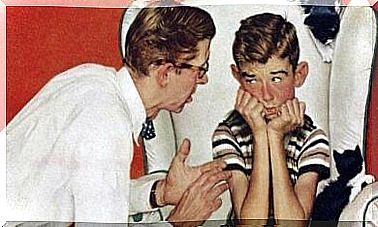Suppressed Or Delayed Grief: When Grief Becomes Chronic

Suppressed or delayed grief occurs when we simply cannot cope with the loss of a loved one. Then the grief becomes chronic and our constant companion. This suffering manifests itself in different ways. You may develop anxiety disorders or experience stress, exhaustion, apathy, or permanent irritability. This is a very common clinical reality.
Many people do not know how to deal with such painful feelings. Intense grief and the suffering associated with it can literally paralyze a person. The feeling of emptiness can make daily life very difficult to cope with.
Other people, on the other hand, concentrate on their daily routines with all their might. In doing so, they charge themselves a lot of work and obligations just to convince themselves that things can go on and that they can master the situation. In addition, they want to convince themselves that everything is okay and try to hide their pain and grief and lock it up deep inside them.
Both cases lead to a condition that manifests itself in the same way. It is a pathological grief in which the loss has not been accepted and the grief work has not been completed. Understand that pain has no expiration date. It can last for decades and slowly settle into every thought you have and guide you in everything you do. Delayed grief can hide behind a wide variety of illnesses. It can also ultimately ruin your chances of ever having a happy life again.

What is suppressed or delayed grief?
Pain can freeze or be permanently trapped, like a seed in an amber. This is exactly what happens when you fail to adequately deal with a painful reality. This can also happen if you tell yourself that it is better to put this topic off and focus on your life instead. This means that you no longer have to think about the person you lost so often.
If there is one thing that grief professionals know very well, it is the fact that each of us experiences grief in very different ways. Basically, most people associate the loss of a loved one with sadness and grief. Experts say it takes an average of one to a year and a half for us to overcome a loss and clear the grief phase.
However, these statements are not entirely correct. When you lose someone, you feel more than sadness immediately after the loss. Feelings like anger, confusion or even fear can arise. Therefore the experience of grief has to do directly with the personality of the person who suffers from it. In addition, the personal resources and also the support that the personal and social environment offers play an important role.
In a study by Dr. Katherine Shear of Columbia University in New York found that it is very difficult to predict how a particular person will react to the loss of a loved one. The study also found that an estimated 5% of the population will experience suppressed or delayed grief during their lifetime. We would now like to explain this process to you in more detail.
Suppressed or Delayed Grief: Symptoms
Suppressed or delayed grief is a defense mechanism. The affected person refuses to accept that he has lost that person. She just can’t face this reality. In addition, these people feel unable to deal with this deep pain. Therefore, the brain then chooses to simply ignore this feeling or to suppress it.
Although this may seem like a good solution at first, the associated psychological stress and emotional repression leads to some serious consequences:
- Anxiety Disorders and Excessive Stress.
- The affected people are overly sensitive. In doing so , they attach undue importance to unexpected or accidental occurrences in their lives.
- In addition, this type of grief can lead to eating disorders or the development of addictions.
- In addition, these people refuse to talk about the loss of the loved one or to put into words the feelings associated with it.
- Even psychosomatic symptoms can manifest themselves. These include indigestion, allergies, migraines, muscle pain, skin diseases and hair loss.
- You may have trouble developing a clear vision or making plans for the future. People who have suppressed or repressed their grief often stop making plans for life or setting goals.
- Social problems can also arise. If you lose your zest for life or your patience or you no longer feel the need to share your life with others, then this will affect your social life. Often those affected lose interest or enjoyment in activities that they have enjoyed so far. Empathy also suffers. If you cannot accept your own pain, then it becomes increasingly difficult for you to perceive it in other people or to understand their feelings.
How can you deal with suppressed or delayed grief?
Those who live with repressed grief should be aware that sooner or later this emotional burden they are carrying will come to the surface. Sometimes a small trigger is enough and countless negative emotions arise. This can push you to your limits. Perhaps it is the death of a pet, the illness of a friend, or just a small, insignificant setback that creates a flood of emotions in you that you can hardly handle.
In the fifth edition of the Diagnostic and Statistical Manual of Mental Disorders (DSM-5) there is no entry on “delayed grief”. However, it does contain diagnostic criteria for a “persistent complex grief disorder”. As experts have now recognized the existence of pathological grief, new forms of therapy have been developed in recent years to treat this disorder. Some of these methods have proven to be very effective.
One example is the therapy proposed by Dr. Julie Wetherell of the University of California, San Diego, was featured in a 2012 study. This study is about a therapy that combines cognitive behavioral therapy with interpersonal psychotherapy and extensive exposure techniques. The main goal is to help the patient to accept the loss and to work on his emotions. Special focus is placed on an emotion that occurs in many cases: feelings of guilt.

Experience a loss
In summary, we can say that no one is prepared for a severe loss. Grief is neither a universal nor a normative process. Rather, it is a dynamic process that can be very painful, complicated and tedious, and it can also lead to psychological problems. If you are ready to ask others for help (and then accept it), then you will deal with this difficult situation better and healthier and be able to process your grief better.









